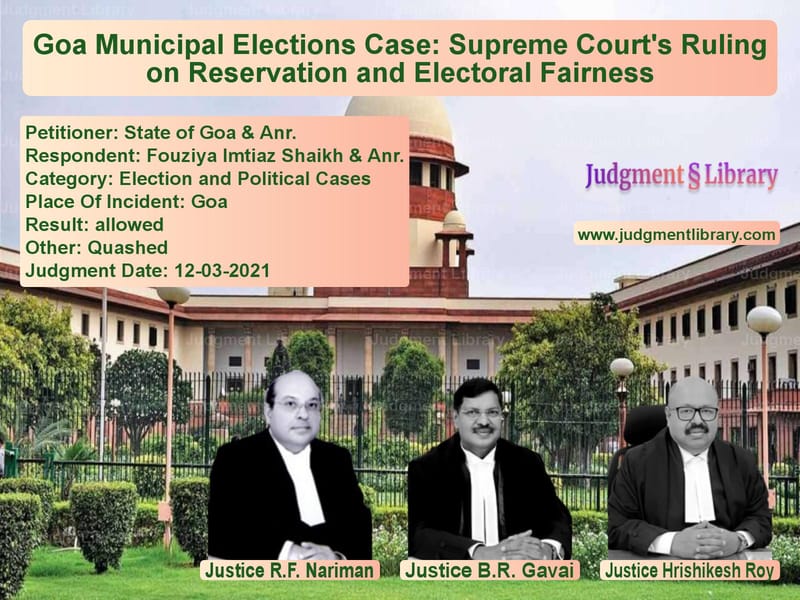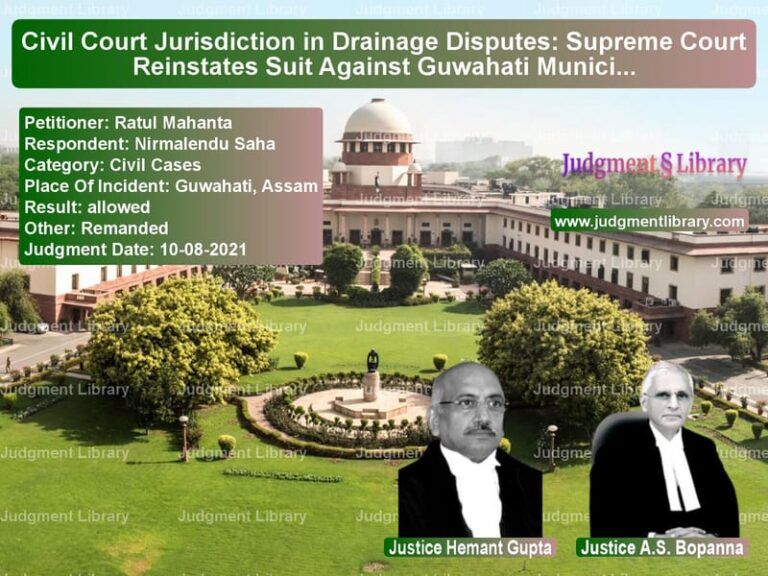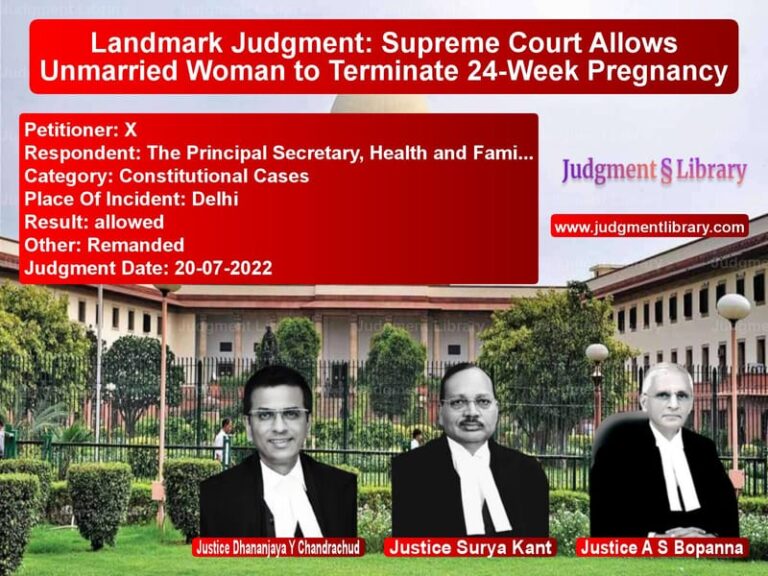Goa Municipal Elections Case: Supreme Court’s Ruling on Reservation and Electoral Fairness
The case of State of Goa & Anr. vs. Fouziya Imtiaz Shaikh & Anr. is a landmark judgment concerning the fairness of municipal elections, the reservation of seats for women and Other Backward Classes (OBCs), and the independence of the State Election Commission (SEC). The Supreme Court’s ruling reaffirmed the importance of constitutional mandates in local governance and set a precedent for ensuring fairness in the electoral process.
Background of the Case
The dispute arose from the notification for elections to 11 municipal councils in Goa, where issues related to seat reservation and delimitation were challenged. The elections had been postponed multiple times due to the COVID-19 pandemic. The final notification was issued in February 2021, with elections scheduled for March 2021.
The primary challenge before the Supreme Court was whether the reservation of municipal wards met the constitutional requirements under Article 243T, which mandates a minimum one-third reservation for women and proportionate representation for OBCs. Additionally, the petitioners raised concerns about the independence of the SEC, which was headed by the State Law Secretary instead of an independent constitutional authority.
Read also: https://judgmentlibrary.com/sarpanch-no-confidence-motion-supreme-court-reinstates-collectors-order/
Key Issues Before the Supreme Court
The case raised several crucial legal questions:
- Whether the reservation of seats in the municipal elections adhered to the constitutional mandate under Article 243T.
- Whether the SEC’s structure and functioning ensured free and fair elections.
- Whether the courts had the jurisdiction to intervene in the electoral process at this stage.
Arguments by the Petitioner
The petitioners, led by Fouziya Imtiaz Shaikh, contended that the reservation of seats was arbitrary and unconstitutional. Their key arguments were:
- The reservation of seats for women was less than the mandated one-third under Article 243T.
- The OBC reservation was manipulated to favor certain groups, violating principles of equal representation.
- The SEC was not functioning independently as it was headed by the State Law Secretary, which raised concerns about government interference in the electoral process.
- The entire delimitation and reservation process was conducted in undue haste, without consulting stakeholders or conducting proper studies.
Arguments by the Respondents
The State of Goa and the SEC defended the election notification, arguing:
- The reservation process followed the Goa Municipalities Act and was legally sound.
- The courts should not interfere in the electoral process once the notification has been issued, as per Article 243ZG.
- The appointment of the State Law Secretary as the SEC was in accordance with state laws and did not compromise election fairness.
- The elections had already been delayed multiple times, and any further intervention would disrupt governance.
Supreme Court’s Analysis
1. Reservation of Seats and Constitutional Mandates
The Supreme Court found that the reservation of seats did not comply with Article 243T. It observed:
- “The reservation for women must be at least one-third of the total seats, but the notification failed to meet this requirement.”
- “The process adopted for OBC reservation lacked transparency and fairness, as there was no proper study to determine the proportion of OBC representation.”
2. Independence of the State Election Commission
The Court strongly criticized the appointment of the State Law Secretary as the SEC, holding that:
- “The State Election Commission is meant to function independently, free from government control, to ensure free and fair elections.”
- “Having a government official serve as the SEC compromises the independence of the institution and creates a conflict of interest.”
3. Jurisdiction of the Courts in Electoral Matters
While acknowledging that courts generally refrain from interfering in the electoral process once elections are notified, the Supreme Court held that:
- “When fundamental constitutional violations occur, courts have the duty to step in and rectify them.”
- “Article 243ZG does not bar judicial intervention in cases where the electoral process itself is flawed and unconstitutional.”
Final Judgment
The Supreme Court quashed the election notification and directed fresh elections to be conducted with proper reservation and an independent SEC. The key directives included:
- Revising the reservation process to ensure compliance with Article 243T.
- Ensuring that the SEC is headed by an independent authority, not a government official.
- Conducting a fresh delimitation and reservation exercise in consultation with stakeholders.
- Scheduling new elections in a manner that does not disrupt governance but upholds democratic principles.
Implications of the Judgment
This ruling has significant implications for electoral governance in India:
- It reaffirms the constitutional mandate for fair and proportionate representation in local elections.
- It strengthens the independence of State Election Commissions, ensuring they function free from government influence.
- It sets a precedent for courts to intervene in election-related matters when fundamental constitutional violations occur.
The Supreme Court’s decision in this case underscores the importance of adhering to democratic principles and constitutional mandates in the conduct of local body elections.
Petitioner Name: State of Goa & Anr..Respondent Name: Fouziya Imtiaz Shaikh & Anr..Judgment By: Justice R.F. Nariman, Justice B.R. Gavai, Justice Hrishikesh Roy.Place Of Incident: Goa.Judgment Date: 12-03-2021.
Don’t miss out on the full details! Download the complete judgment in PDF format below and gain valuable insights instantly!
Download Judgment: state-of-goa-&-anr.-vs-fouziya-imtiaz-shaik-supreme-court-of-india-judgment-dated-12-03-2021.pdf
Directly Download Judgment: Directly download this Judgment
See all petitions in Public Interest Litigation
See all petitions in Constitution Interpretation
See all petitions in Legislative Powers
See all petitions in Judgment by Rohinton Fali Nariman
See all petitions in Judgment by B R Gavai
See all petitions in Judgment by Hrishikesh Roy
See all petitions in allowed
See all petitions in Quashed
See all petitions in supreme court of India judgments March 2021
See all petitions in 2021 judgments
See all posts in Election and Political Cases Category
See all allowed petitions in Election and Political Cases Category
See all Dismissed petitions in Election and Political Cases Category
See all partially allowed petitions in Election and Political Cases Category







